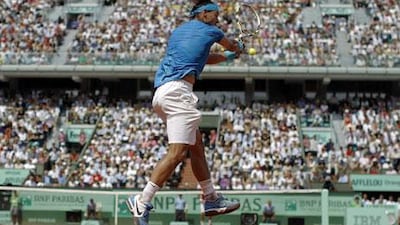Twenty-eight long months and nine exhaustive grand slam tournaments later, here they reappeared in tandem, strolling out for a Sunday final, Roger Federer first in the reddest red, Rafael Nadal next in the bluest blue, the Paris clay in its usual terra cotta.
They posed for the traditional finalists' photograph at the net and, in yet another gesture of their protracted mutual respect, Nadal put an arm halfway around Federer and a hand amid Federer's back.
Here came Sunday with Roger and Rafa yet again, with two faces so markedly familiar for people we don't actually know, their entrance almost sufficient, just one tepid question beneath.
Could this 25th instalment of one of sport's finest rivalries distinguish itself from the others and send the series in a fresh direction?
Educated guesses said no. Educated guesses looked at Nadal's 4-0 record against Federer in Paris and foresaw the absence of freshness and the deepening of rote old chapters. This gorgeous ecosystem of a rivalry, born in Miami way back in 2004 with Nadal at 17, cemented at Wimbledon in 2008, did not figure to sprout any new branches or tributaries.
But then it did so.
Where most of the Federer-Nadal predecessors in Paris had known few significant mood swings, this one meandered fickly. It became compelling study of countenances in a thick psychological path. The moment you would assume something, it would become untrue.
First, in a departure unseen since Federer opened with a 6-1 set in the 2006 final, the match began with Nadal as the one playing uphill.
Federer's shots had most of the happy geometry, his aggression worked and Nadal looked fretful, not least because his removal of his left shoe in a changeover appeared to reveal a savage blister. Curiously, the long rallies seemed to favour Federer.
With Federer's level in the vicinity of vintage after his "slump" of early 2011 and Nadal's a few notches below his Paris hilt after his self-acknowledged confidence crisis, Federer up and led 5-2 with a break point that doubled as a set point, seeming untroubled when his backhand half-drop shot fluttered just wide on that.
Just about then, though, the super-action-hero Nadal arrived, and Nadal began his knack for the most offensive defence in the game's history. For the point when finally he broke back, he made it clear that he would run down shots even if they turned up in Versailles. You could almost hear one of his saves creaking as it croaked barely over the net. From corner to corner he went until he sent an able thing up the line and Federer's lunging volley struck net. And Federer's face changed utterly.
In the greatest champion of the game it was possible to spot doubt and negativity, while Nadal bounced around and practised sweet geometry and blasted some winners and won the set 7-5. If Federer's losses to Nadal previously at Roland Garros did not seem likely to disrupt future sleep patterns given their decisiveness, that first set with its openings and its slammed doors seemed capable of wreaking some unrest.
Still: the resolve of greatness. Federer looked dormant in the second set yet steeled before fading. He looked even deader in the third set yet steeled to extend the match.
In the second, he fought through two set points and sprang to something that nibbled at dominance as the match swaying again, but then flung some errors - 23 in the set, although you wonder how many errors against Nadal should count as "unforced" - and succumbed to a spirited Nadal in the tiebreaker. In the third, Federer appeared drained of all might but then roused himself again.
Only in the fourth set did the occasion go emphatic either way, as Nadal trailed love-40 on his serve to start the set but then became indomitable, flying all over, capable of hitting any shot from anywhere up any line or across to any corner. He became his utmost Paris beast, leaving Federer to rethink the first set and maybe the second.
Just after their latest heartfelt hug, after another Sunday so much of the world feels lucky to see, Federer sat. Nadal exulted back out in the court, and Federer sat. Their difference in grand slam titles stood narrowed to 16-10, and Federer sat. This preceded their gracious speeches in which Nadal's praise left Federer looking genuinely moved.
No, in this moment, you just saw a 16-time grand slam champion, reenergised through two weeks in Paris but now looking downright crestfallen, disconsolate to the possible edge of haunted.
That, unlike the rest of this rivalry, was hard to watch.

